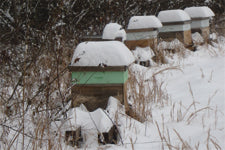
This is the time of year when many of us are longing for the warm days of Spring to arrive, but this year we are truly besieged in full-on winter weather. Usually by the first of February in Georgia, it’s beginning to warm up enough that we can check on our hives to see how they are faring from over wintering. So far, it’s been much too cold to open the hive. When the temperature is going to be below freezing at night, you just don’t want to risk opening the hive. This winter has been cold -- so we haven’t opened the hives at all. We do try to keep some honey out for the bees, just in case they need food. (It’s important that you do NOT use store bought honey to feed your bees though. Store bought honey can contain contaminants and is often heat treated.) It’s been so cold though, that we have to make sure the honey doesn’t freeze. When it warms up a bit more, we will put out some sugar water for them.
Condensation is one of the most dangerous issues bees have to face during winter. In the north, condensation in a hive over winter is lethal to honey bees. And it’s been cold enough this winter in the south that this could be an issue for our bees. Even though it’s not warm enough to open up the hive and check on the bees, you can do a visual surveillance of your hive to determine that water is not building up in or around the hive. Having a small upper and lower entrance will help to adequately ventilate the hive while avoiding condensation. Make sure hives are not placed in hollows and low land where airflow becomes trapped by the landscape features. Also look for water pooling and flooding. A slight elevation in the back of the hive can aid in water drainage, eliminating moisture in the hive.
We hope that these tips will help you maintain your hive the rest of the winter. We are looking forward to warmer days when we can open up our hives and do a full inspection!
